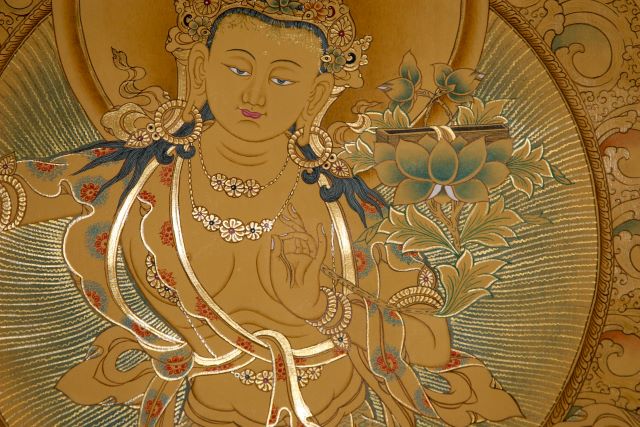Manjushri Meditational Deity Thangka Painting

Stock Photos and Videos of Nepal
Shutterstock Alamy Pond5 Dreamstime 500px
In Mahayana Buddhism, Manjushri is considered a fully enlightened bodhisattva and is, thus, highly regarded and worshipped as a “meditational deity. ” He is considered one of the four great bodhisattvas in Chinese Buddhism alongside Bodhisattva Samantabhadra. It would be important to consider how his position within the tradition is constituted by historical background, figures of association, and implications of worship in Chinese Buddhism.
The name Manjushri, when translated into Sanskrit, basically means “Gentle Glory” or “Sweet Splendor”; he was considered the Wiseman, possessing a sword of wisdom that cuts through delusion. He is often visualized as a young prince who holds a sword in one hand and a lotus flower in the other, showing how to cut through ignorance and bring enlightenment. Manjushri is considered the embodiment of the wisdom of all Buddhas and is regarded as the patron deity for scholars and seekers of knowledge. In Chinese Buddhism, Manjushri counts as one of the four great bodhisattvas, joined by Avalokiteshvara, the bodhisattva of compassion; Samantabhadra, the bodhisattva of universal virtue; and Kshitigarbha, the bodhisattva of hell-beings. Manjushri often constitutes a pair with Samantabhadra; these bodhisattvas symbolize Wisdom and Compassion, respectively. Put together, they are the twin attributes one needs to achieve enlightenment and help all sentient beings achieve liberation.
In Tibetan Buddhism, including Mahayana Buddhists, it is common to meditate on Manjushri as a Buddha. The practitioners believe that their meditation on Manjushri and repetition of his mantra can help them in developing wisdom, and clarity of thought, and overcome obstacles on the path to enlightenment. Another associated practice with Manjushri is the perfection of knowledge known as Prajnaparamita, which is considered one of the most important Mahayana Buddhism teachings.
The most famous figure associated with Manjushri in Chinese Buddhism was none other than the great poet-scholar known as Kumarajiva. Kumarajiva was a prominent translator of Buddhist scriptures and one of the prime movers in the spread of Mahayana Buddhism throughout China during the 4th century. He had reputedly received teachings directly from Manjushri by way of a dream and, as such, was devoted to the said Bodhisattva and put his work into translating Buddhist scriptures into Chinese.
Among the most important figures associated with Manjushri, there is a Chinese monk Xuanzang, who became famous for his travel to India in search of Buddhist scriptures during the Tang Dynasty. His wisdom inspired Xuanzang and sought protection and guidance during his hazardous voyage. This scholar finally came back to China with a huge collection of Buddhist texts that influenced the development of Chinese Buddhism.
This practice of worshipping Manjushri as a meditational deity has great ramifications on Chinese Buddhism and the lives of devotees seeking his guidance and blessing.
By the mental and topical repetitions, practitioners seek to acquire wisdom, clarity, and insight that will lead them to their enlightenment. Manjushri is said to teach wisdom and perfection of wisdom, both of which are fundamental to the Mahayana path and integral to the practice of Tibetan Buddhism. Finally, Manjushri is believed by Chinese Buddhism to be a fully enlightened bodhisattva and the meditational deity that symbolizes wisdom and the slice that cuts through ignorance.
His teachings on wisdom and the perfection of wisdom have stood the test of time and continue to inspire people in Mahayana Buddhism even today, aspiring to attain enlightenment and liberation.
This combination of Manjushri with Samantabhadra speaks to both wisdom and compassion being paramount in the Buddhist path and their worship as two of the four great bodhisattvas shows their importance within the Chinese Buddhist tradition. His guidance and blessings are still pursued by followers through meditation and devotion to Lord Manjushri on their spiritual road to enlightenment.
DISCLAIMER: This was generated with the help of AI. This technology is new and constantly improving. Please verify the accuracy before sharing.
